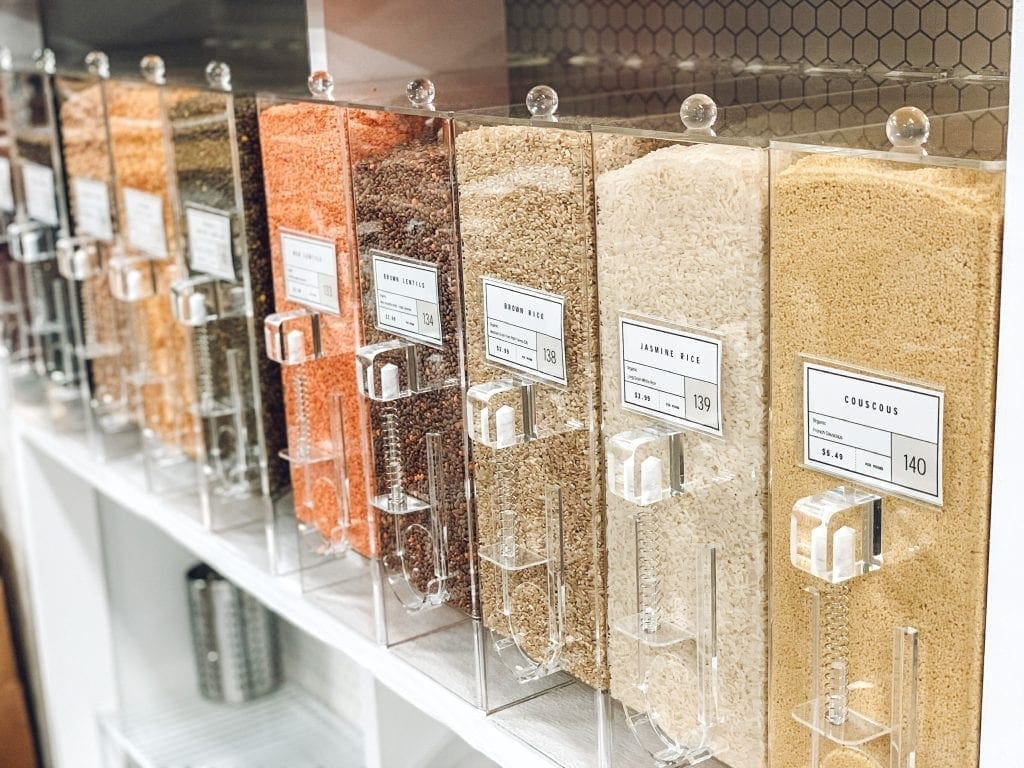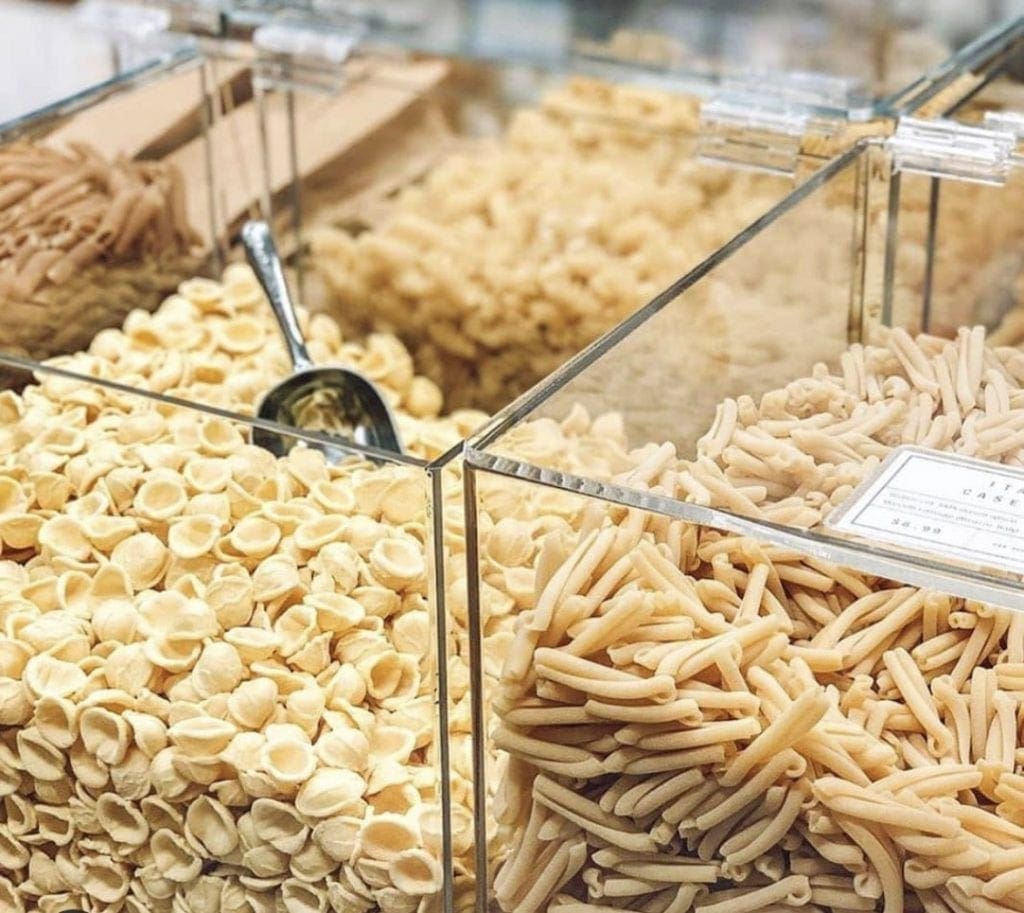Rachel Garcia is a Maplewood, New Jersey local and a mother, but when she started to notice the growing issue of plastic and food waste, she decided to become a business owner too. Garcia opened Dry Goods Refillery in February 2020, just a few weeks before the pandemic hit. At her plastic-free pantry, eco-conscious customers can bring in their own containers to fill with a variety of pantry items, and they can customize their grocery shopping to their specific needs.
The store runs on a quick and easy weigh, refill and checkout system. Customers simply weigh their container, refill it with any selected product, reweigh and checkout. Every aspect of the shopping experience has been accounted for. DGR also provides containers in-store, for consumers who prefer buying them directly from the business.
The range of products offered at DGR span a variety of grains and rice, flours and baking items, beans and legumes and more. They also stock healthy snacks, supplements, and NJ-made products. Essentially, it offers locally sourced versions of pantry necessities.
The DGR concept allows customers to buy as much or as little as they need, resulting in less food waste. The container reuse system also reduces plastic use in customers’ own lives. DGR also sources all of their products locally, supporting a smaller and more sustainable food supply chain. The concept is one-of-a-kind in New Jersey, so I took the time to chat with owner Rachel Garcia to learn more about the inspiration and details behind Dry Goods Refillery.

What is the concept behind Dry Goods Refillery?
Our entire store’s operation is focused around reducing your waste and reusing your containers. Every vendor, every package, every minute you’re in the store—that’s the entire goal. We’re using better and smaller vendors, we’re buying in bulk to reduce packaging and we’re mindful of all of our waste. We pay to have all of our waste recycled, so it’s something we’re always conscious of.
We also want shopping to be easy for you! It’s not just about taking what you need, that’s part of it and it’s great, but it’s not the point behind what we’re doing. We are not there to sell you, we’re here to help you. Ultimately, we’re focused on reconfiguring the way we think about how food gets to our plate.
Why did you feel that now was a good time to start a venture like this?
The American mindset is changing; there’s a cultural interest in the food supply chain. We used to know where our food came from, and now we’ve gotten too far away from this. I think it’s a reflection of the climate crisis. Now that it’s a more mainstream issue, it feels like people are willing to start having that conversation for real, which is exciting!

How did becoming a mom impact the way that you saw this waste issue?
When I had kids, the packaging started piling up. We didn’t have much spare time, so we were buying out of convenience. The goal of DGR is not to eliminate convenience, but to eliminate unnecessary packaging, or having to buy multiples just for one meal. We started to get lazy, and I just remember how quickly food packaging piled up. At the grocery store, I also had to buy multiples of a single item just for one dinner. I figured, if I’m feeling stressed about it, others probably are too.
How did your travels change the way you saw the American grocery store?
My eyes were really opened living outside of the United States. I was very fortunate to have lived in Buenos Aires for a year. It just felt like every time I walked into a corner store or a market it felt fresher, or more local or less packaged. Once I saw it I just couldn’t stop seeing it. I knew [how we shop in the United States], it wasn’t how other people in the world were shopping. It was simply a matter of making the changes here in order to show people that there is another way.

How is DGR different from chain grocery stores with fill-your-own-container options?
Here, everybody has a station, and we’re not your bulk store, we have all the tools you need. I tried the bulk area in Whole Foods, but each time I had to go to customer service. They didn’t know how to take out the tare weight, and they had no tools to fill your containers. It was a process, and it became stressful. Those grocery stores were offering things that weren’t addressing the packaging problem. It actually costs more money to use your own containers, and I kept thinking “this cannot be the way.”
How did opening right before the pandemic hit New Jersey impact your business?
The wheel of convenience that was driving this pre-packaged life has slowed down. People have been forced to slow down, and now they come here thinking “this is my joy, this is my break, this is not the stress of the grocery store. I’m taking the time for myself and taking the time to grocery shop with purpose.”
As crazy as it was, it was a blessing for our business. We were able to stock products that grocery stores could not. Where restaurants were struggling with the bulk food service supply chain, we turned to the smaller places that were suffering. Smaller suppliers could sell to us, and people spread the word, and we were happy to support them.
We never thought we would have an online business either. Curbside pickup was a speed bump we had to overcome, but here you don’t have to worry about the time slot like you do at Whole Foods. We can get you food curbside without a big wait. It’s changed the way customer flow and sanitation was before, it helped us rework our customers’ experience to make it safer and more efficient.
I personally have made changes that have stuck since the beginning of the pandemic. I wanted to stay out of the grocery store, so I looked into getting a milkman, looked at local breadmakers, small-scale farms and butchers. We’re trying to make everything hyperlocal.

Do you have any advice for those who are trying to reduce their own waste at home?
Start small. It’s very intimidating to see the term “zero-waste,” and it’s very hard to think that you’ll ever get there. Start with something that really works for you. Don’t feel like you have to do everything all at once. For us, it was replacing plastic water bottles with reusable bottles. Now, we bring them with us every time we leave the house. You’ll never have to buy a bottle again.
I used to be a big paper towel user, so I started to leave out the paper towel and the cloth towel right next to each other. After a while of consciously choosing the cloth instead, I realized that I could make most things work without the paper towels, but I knew the paper towels were there if I needed them.
It’s not always simple, it’s real life, but we try hard to reduce our waste. Pick whatever works best for you. Pick something you’re committed to refilling: honey, olive oil, spices. Every small change will start to lead to the next one, it’s an evolution.
Where is Dry Goods Refillery going from here?
We are 100 percent on board in 2021 to open NJ’s first dedicated plastic-free grocery. It’ll have its own fresh bakery, dairy and produce. We want to create a true one-stop-shop with a more local and sustainable supply chain.
We are finalizing the last pieces of a Kickstarter campaign in the next two weeks to excite the community. We want to involve the community. Even if it’s just a dollar contributed, you feel like a part of the mission.
For more information on Dry Goods Refillery, check out their website or Instagram page.
Main photo of Rachel Garcia in storefront courtesy of Dry Goods Refillery.
Jordan Hutchinson is a second semester senior at George Washington University with aspirations in writing, editing, and publishing. A Jersey girl at heart, she grew up in Morris County and moved down to Atlantic County this past fall.
- Jordan Hutchinsonhttps://thedigestonline.com/author/jhutchinson/
- Jordan Hutchinsonhttps://thedigestonline.com/author/jhutchinson/
- Jordan Hutchinsonhttps://thedigestonline.com/author/jhutchinson/
- Jordan Hutchinsonhttps://thedigestonline.com/author/jhutchinson/


